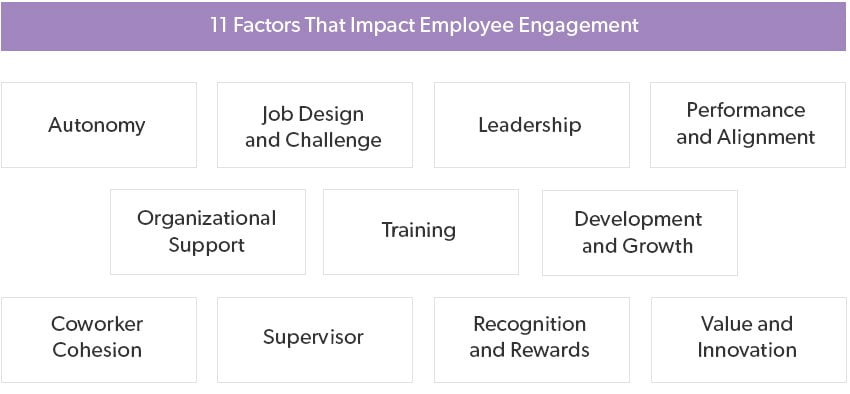
Employee engagement is generally defined as a positive, fulfilled state of the employee regarding their work and their organization. Employee engagement is characterized by vigor, dedication, and absorption in work-related activities. Unsurprisingly, employee engagement connects with many desirable outcomes, including high performance, overall positive attitudes, better mental health, and increased innovation. If employees are not engaged, they tend to burn out and disconnect from their work.
Unengaged employees take more sick days, have less knowledge about their work roles, and are more likely to quit the organization. Obviously, employee engagement is important!
But how would we measure employee engagement? Here at ERC, we use two different approaches in each employee engagement survey.
First, we look directly at employee engagement by asking employees how inspired they are by their organization, how willing they are to do more than their minimum job requirements, and how meaningful and fulfilling they find their work. Answers to these questions provide a general picture of the employees’ level of engagement.
Second, we look at 11 different areas that have been shown to impact employee engagement. If employee engagement is not at an ideal level, it could be due to any combination of the following factors, which we measure in each survey.

Here are the 11 different areas that we look at:
1. Autonomy
The degree to which employees are accountable for their results, influences the selection of their work, and has the power to manage the flow and pace of their work
2. Coworker Cohesion
The degree to which employees care about one another, help others when needed, receive help from others, and trust that fellow employees have the skills and experiences needed
3. Development & Growth
The degree to which employees feel that they have opportunities for learning, growth, and career advancement
4. Job Design & Challenge
The degree to which employees feel that they can use specialized skills, work on important projects, use their abilities, and share their ideas and opinions
5. Leadership
The degree to which employees feel that the organization’s top leadership team provides clear goals and direction, are concerned about employees’ well-being, and can be trusted
6. Supervision
The degree to which employees feel that their immediate manager is supportive, considerate of their needs, and provides feedback on performance
7. Recognition & Rewards
The degree to which employees feel that they are recognized and praised, paid competitively, and given rewards fairly
8. Performance & Alignment
The degree to which employees are aware of the organization’s overall performance, understand their contributions to this performance, and clearly understand the organization’s strategy
9. Organizational Support
The degree to which employees feel that the organization provides them with the flexibility necessary to meet their personal and family needs, supports their health and wellness, and provides sufficient opportunities to reach out to the community
10. Training
The degree to which employees feel that the training they have received is specialized for their job function, has improved their job performance, and has helped them qualify for better jobs
11. Value & Innovation
The degree to which employees perceive that the organization continually adapts, has superior customer service, and supports innovation and creativity.
Combined, measurement of employee engagement and the 11 factors that influence employee engagement will identify areas for improvement, leading to an increase in productivity, performance, and a number of other positive outcomes. Employee engagement is vital for both employees and organizations!
Interested in learning more about engagement surveys?
Submit your contact information and receive instant access to a brochure that overviews what is included in ERC’s engagement surveys and our process for conducting and assessing.

